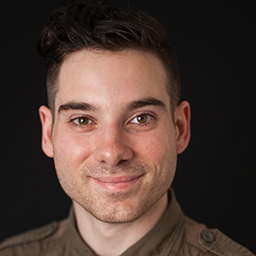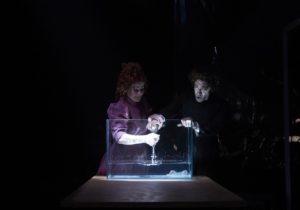It’s rather like an episode of Mission Impossible: take a 500-page book and condense it into an 80-page opera libretto, leaving ample space for the music to weave its spells. This was the assignment Pierce Wilcox undertook in penning the words for Elliott Gyger’s opera of Oscar & Lucinda. Amid myriad editing, narrative and aesthetic decisions, Wilcox also had to preserve the essence of Peter Carey’s treasured novel of love, faith, gambling and glass in Australia’s colonial era, which won both the Booker Prize and Miles Franklin Award.

Wilcox and Gyger began by isolating what they considered core episodes, and then devised a structure. In a move that killed several problematic birds with one stone, Wilcox replaced the book’s first-person narrator with a chorus. “That chorus isn’t a person,” he says, “but represents what you might call chance or might call God, and it allows us to do a lot of the things that a narrator does: describing characters, introducing them, and often taking quite a wry, distant perspective on these people.”
The idea of the chorus being somewhere between chance and God neatly dovetails with Oscar’s perception of games of chance being determined by God. “The very first image of the opera is of Oscar throwing a stone to determine his future,” says Wilcox. “He’s drawn this hopscotch board, and where the stone lands will determine how he spends his life.” Wilcox’s solution to the chance element – to have another figure take Oscar’s stone and place it on the right square – spawned the chorus idea.
While Carey’s language and characterisations are steeped in almost Dickensian luxuriance, Wilcox largely pared his own text back to short, stabbing lines. He saw his job as providing outlines for the music, performances and design elements to colour with the requisite richness and texture.

“We talked about the term ‘fragments’ a lot in creating this work,” he says, “because of course there’s the dominant image of glass breaking – a Prince Rupert’s Drop shattering into a lot of fragments. I think the notion of fragments was crucial to the structure that Carey created: very short chapters, rather than long, rambling ones. So for me the short lines are the equivalent of those fragments.”
Prior to this Gyger and Wilcox had written another work for Sydney Chamber Opera based on David Malouf’s Fly Away Peter. Wilcox now sees this as ideal preparation for the more ambitious task of transforming Oscar & Lucinda, because he already knew he could trust Gyger to flesh out his verbal sketches. “I suppose the main job of the librettist is to have the faith in the rest of the team,” he says.
Much toing and froing continued once Gyger was setting the words. “I’d say, ‘I pictured this scene as rushing towards its conclusion’, or ‘I pictured we could take some time here’,” explains Wilcox. “So not musical responses, so much as questions of pacing.”
Ultimately opera is a music-led art, and Gyger, in turn, could request more text for a given scene. “Sometimes that will come from a musical place,” says Wilcox, “and sometimes he will also come from a dramatic place, and he’d say, ‘I don’t think we know Wardley-Fish well enough, yet. I need five more lines to get to know him as a character.'” Gyger also pointed out that the romance between the protagonists was overwritten in an early draft, and that the string section could handle that. “Let the music fall in love for you,” he told Wilcox.
Originally from Queensland, Wilcox came south to study drama, and, after writing what he terms “a very bad play”, was invited to pen the libretto for Notes from Underground, Sydney Chamber Opera’s first show.
Two operas later, Oscar & Lucinda’s cast of six has tenor Brenton Spiteri and soprano Jessica Aszodi in the title roles, and four singers playing everyone else, the characters delineated by costume changes witnessed by the audience. “A lot of writing opera for the composer and the librettist is presenting insane and impossible challenges to your production team,” says Wilcox. “We did that, they’ve absolutely risen to the challenge.”
Oscar & Lucinda: Carriageworks, July 27-August 3.